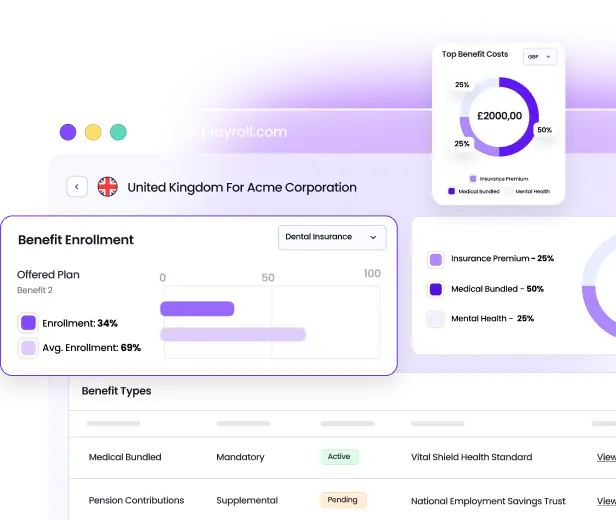Who Is Entitled to Employee Benefits In Norway?
In Norway, most employees working under a valid employment contract are entitled to core statutory benefits. These legal entitlements typically apply regardless of whether an employee is full-time or part-time, as long as they fall within the definition of an employee under Norwegian labour law. Independent contractors and freelancers, however, are not covered by the same protections.
Entitlement can vary slightly based on factors like length of service, salary level or collective agreements, but the baseline protections under the Norwegian social welfare system ensure that employees have access to a broad range of benefits. This strong statutory framework reflects Norway’s commitment to employee welfare and workplace security.
Overview of Employee Benefits In Norway
Employee benefits in Norway are known for being comprehensive, reflecting the country’s high standards of living, social equality and strong focus on employee well-being. Compared to many other countries, employers must meet a significantly higher baseline of mandatory benefits. However, Norwegian employees also expect employers to go beyond the minimum, offering additional benefits that promote work-life balance and long-term financial security.
Mandatory Employee Benefits In Norway
Mandatory benefits are legally required and form the core of any employee benefits package in Norway. Here’s a comprehensive list of mandatory benefits in Norway:
Social Security Contributions
Employers are legally obligated to contribute to Norway’s national social security system. This system supports a range of services, including pensions, sick leave, disability and unemployment benefits. Employers must register each employee with the authorities, submit appropriate documentation and ensure timely contribution payments.
Mandatory Occupational Pension (OTP)
All Norwegian employers must provide an occupational pension plan with a minimum contribution of 2% of the employee’s salary. While many employers contribute more to stay competitive, this mandatory scheme secures employees' retirement savings. Compliance involves accurate reporting and enrolling all eligible employees.
Paid Annual Leave
Employees are entitled to a minimum of 25 working days of paid annual leave. Individuals over 60 years old receive an extra week. Employers must manage leave records meticulously, calculate holiday pay correctly, and comply with the Holiday Act's provisions.
Parental Leave
Norway boasts one of the world’s most generous parental leave schemes. Eligible parents can share close to 12 months of leave, with income compensation depending on their chosen plan. Specific weeks are allocated to each parent to encourage equal caregiving responsibilities. Employers handle leave applications and ensure proper administrative documentation.
Sick Pay
During the initial period of sick leave—typically up to 16 days—employers must pay full wages. After this, benefits are provided by the national insurance scheme. Employers are required to track leave and obtain medical certificates when needed to ensure compliance.
Supplemental Employee Benefits In Norway
Supplemental benefits are not required by law, but can help you stand out as an employer and attract top talent. They include:
Private Health or Dental Insurance
Despite Norway’s universal healthcare, many employers offer private medical or dental insurance to give employees quicker access to specialists or additional services. This benefit can reduce absenteeism and improve employee satisfaction.
Additional Pension Contributions or Voluntary Savings
To help employees boost their retirement savings, many companies offer enhanced pension plans or voluntary savings schemes. These options are especially attractive to mid-to-senior level professionals seeking long-term financial security.
Additional Paid Leave or Flexible Working Hours
Work-life balance is a high priority in Norway. Offering more paid time off or flexible working hours helps employees manage personal responsibilities while improving morale and retention rates.
Wellness Programmes and Mental Health Support
From gym memberships to access to mental health counselling, wellness initiatives are increasingly popular. These benefits promote overall employee health, reduce stress-related absences and signal an employer’s care for their staff's well-being.
Life or Disability Insurance
Some employers offer life or disability coverage beyond the statutory minimums. These benefits enhance financial security for employees with dependents and demonstrate a commitment to long-term well-being.
Tax Implications of Employee Benefits in Norway
Many employee benefits in Norway are subject to taxation, depending on their nature. In-kind benefits such as private health insurance or company perks may be considered taxable income and must be reported through payroll.
Employers can typically deduct contributions such as pension payments as business expenses. Accurate documentation—payroll records, contribution logs, and benefit agreements—is crucial to staying tax compliant and avoiding penalties.
Legal Considerations for Employee Benefits in Norway
Norwegian employers must comply with several key laws when offering benefits, including the Working Environment Act, the Holiday Act, and legislation on pensions and social security. These laws define what benefits are required, how they should be administered, and what protections employees receive.
Failing to meet legal requirements—such as not enrolling employees in occupational pensions or mismanaging leave—can result in fines, penalties and employee claims. Employers should also watch for any collective agreements that may impact entitlements.
To stay compliant, employers should conduct regular annual reviews of their benefits packages, ensuring alignment with updated laws, tax rules, and workforce expectations.
How Benefits Impact Employee Cost
Employee benefits in Norway significantly increase overall employment costs. Mandatory contributions like social security and pensions, as well as paid leave entitlements, add to the base salary expenses.
However, investing in strong benefits often improves retention, productivity and job satisfaction. Employers can manage costs by benchmarking benefits, offering scalable voluntary perks and working with experienced local payroll providers.
Disclaimer
THIS CONTENT IS FOR INFORMATIONAL PURPOSES ONLY AND DOES NOT CONSTITUTE LEGAL OR TAX ADVICE. You should always consult with and rely on your own legal and/or tax advisor(s). Playroll does not provide legal or tax advice. The information is general and not tailored to a specific company or workforce and does not reflect Playroll’s product delivery in any given jurisdiction. Playroll makes no representations or warranties concerning the accuracy, completeness, or timeliness of this information and shall have no liability arising out of or in connection with it, including any loss caused by use of, or reliance on, the information.
.svg)
.svg)
.svg)





.svg)



.png)












.webp)









.svg)